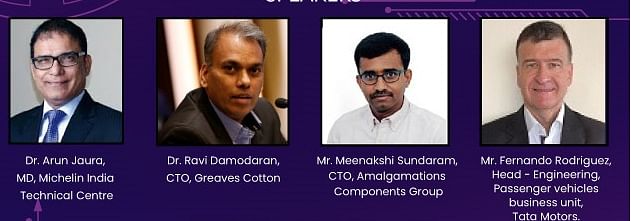Dr Ravi Damodaran: “Create a technology roadmap and build capabilities to execute it.”
He highlighted on the need to “understand the technology trends and their impact on the market and our companies in India.”
The ongoing Covid-19 pandemic might may stagger the investments in tech development of Indian companies but it is unlikely to put brakes on it, said Dr Ravi Damodaran, Chief Technology Officer (CTO) at Greaves Cotton.
“The best way to come out of any disruption is to have a tech related roadmap and then follow on it” said Damodaran while speaking at a webinar organised by Autocar Professional to celebrate the National Technology Day.

The webinar which was titled as “Pushing the Technology Envelope” had some of the leading starwarts of the industry including:
- Dr Arun Jaura, managing director, Michelin India Technology Centre
- Dr Ravi Damodaran, CTO, Greaves Cotton
- F Rodriguez, Engineering Head, TataMotors
- Meenakshi Sundaram, CTO, Amalgamations
Damodaran, whose current role at Greaves Cotton involves leading the technology development in mobility, energy and farm sector reveal that pushing the technology envelope requires adoption of three key ingredients by a company. The first one is to understand the technology trends and its impact on the company. The second is to create a technology road map and third is to build capabilities to execute the plan.
According to Damodaran, ‘timing’ of execution is very important as successful companies are those which know when a certain technology can be used for mass market. Thus creating a sequence of tech innovations that the company wants to get into” Damodaran further adds.
Offering an example of Honda Motorcycle and Scooter India (HMSI) which changed the market dynamics with its gearless scooters in India Damodaran remarks, “ "The Indian two-wheeler industry is a big manifestation of the role technology plays - Honda used its technology power & put a gearless scooter in the market in response to customer needs. And in just 10 years it captured the market." With about 56 percent of total scooter sales in India HMSI currently stands as a market leader in the segment.
He explained that the Indian companies traditionally have been averse to investments in advanced technologies, though it is a vital factor which helps to differentiate in an intensely competitive market like India.
Creating a product differentiator
Sharing a comparative chart of various countries differentiating in a competitive environment, Damodaran pointed out that India’s position is still in the bottom rung. He emphasised on the, “Need to push the technology envelope is to meet evolving market and customer needs, to differentiate in a competitive market environment and also bring about environmental sustainability.”
According to Damodaran, “Differentiating in a competitive environment has many aspects- Companies in mature economies having highly competitive markets need to constantly reinvent themselves.” He feels, “the maturity of the Indian economy is still a long way before it can play catch up with the leaders in this space. A key reason is we do not have the kind of production level that can help us in differentiate in a competitive markets. This is the key reason why we need to push the technology envelope, especially in the manufacturing space.”
Successful execution key to planning
He highlighted on the need to “understand the technology trends and their impact on the market and our companies in India.” Perhaps what really set the direction for future was Domadaran’s closing remarks, “Need to have a technology roadmap and also the ability to successfully execute it.”
Read More
India Auto Inc needs greater tech planning, penetration and execution: Experts at Technology Day webinar
Dr Arun Jaura: “The dynamics of the automotive industry will completely change and we have to be prepared for that."
Fernando Rodriguez: “Safety is going to be one of the technology drivers for the future.”
Meenakshi Sundaram: “Differentiating between product value will be the key to winning more customers.”
RELATED ARTICLES
Cosmo First diversifies into paint protection film and ceramic coatings
The Aurangabad, Maharashtra-based packaging materials supplier is leveraging its competencies in plastic films and speci...
JSW MG Motor India confident of selling 1,000 M9 electric MPVs in first year
The 5.2-metre-long, seven-seater luxury electric MPV, which will be locally assembled at the Halol plant in Gujarat, wil...
Modern Automotives targets 25% CAGR in forged components by FY2031, diversifies into e-3Ws
The Tier-1 component supplier of forged components such as connecting rods, crankshafts, tie-rods, and fork bridges to l...






 12 May 2020
12 May 2020
 8613 Views
8613 Views





 Autocar Professional Bureau
Autocar Professional Bureau




